How to Stop Being a People-Pleaser But Still Be Nice: 8 Secrets

Are you always focused on making people happy? Do you often do things to avoid conflict? If you answered yes to these, this article is for you. Here are eight powerful ways how to stop being a people-pleaser but still be nice. Yes, that’s totally possible.
This post contains affiliate links, which means I may earn a small commission if you make a purchase, at no cost to you. See my disclaimer for more info.
My People-Pleasing Past
A while back, after building up the courage to speak to a toxic person about something hurtful they did, I decided not to go to a party because I’d be sitting at the same table with that person. But after being pressured and persuaded by that same toxic person, guess what I did.
I went against my better judgment and fell into my people-pleasing ways, not wanting to ruffle any more feathers. Trying to be the “bigger person,” I attended the party.
After that person had intentionally excluded me all night, I went outside into the bitter cold, wearing my little party dress and trudging my new heels through snow and slush. Tears and black mascara ran down my cheeks.
All because I didn’t want to say no and have that person or others be upset or disappointed that I didn’t attend.
That was a harsh lesson but a critical one. It helped me overcome my tendency to please others and stop caring so much about what people think of me.
If you’re stuck in this pattern, that likely means people are taking advantage of you. No one deserves that.
Now that I’m comfortable saying no, setting boundaries, and not worrying about what others think, I want to use my hard-earned experience and clinical knowledge as a former Registered Social Worker to help guide you.
Below, you’ll get the most powerful and scientifically proven ways to help you break this habit and live more joyfully.
What is a People-Pleaser?
A formal definition of a people pleaser is:
“a person who has an emotional need to please others often at the expense of his or her own needs or desires” (1)
Simply put, a people-pleaser is someone hungry for others’ approval and afraid of rejection and conflict.
A chronic people-pleaser will go out of their way to make people happy, even if it’s detrimental to their well-being. For example, they may give up time with their family, bend their values, or even extend their limited budget to please others.
People-pleasing is a frustrating and exhausting cycle as you keep giving of yourself without getting much in return.
8 Telltale Signs of a People-Pleaser
Here are the most common signs of a people pleaser:
- You say sorry. A lot.
- You say “yes” to requests or events that you don’t want to attend and are not interested in.
- You avoid conflict at all costs.
- You’re preoccupied with what others think about you.
- You give too much of yourself too soon.
- You’re terrified about people being mad at you and get anxious over it.
- You tend to act the same way other people around you are acting. For example, feeling pressured to drink because everyone else is, so you cave in.
- You take care of others’ needs before your own, which leaves you feeling overworked and exhausted.
If you said yes or can relate to any of these signs of a people pleaser, the great news is there’s hope! I can attest to that as a recovering people-pleaser.💪
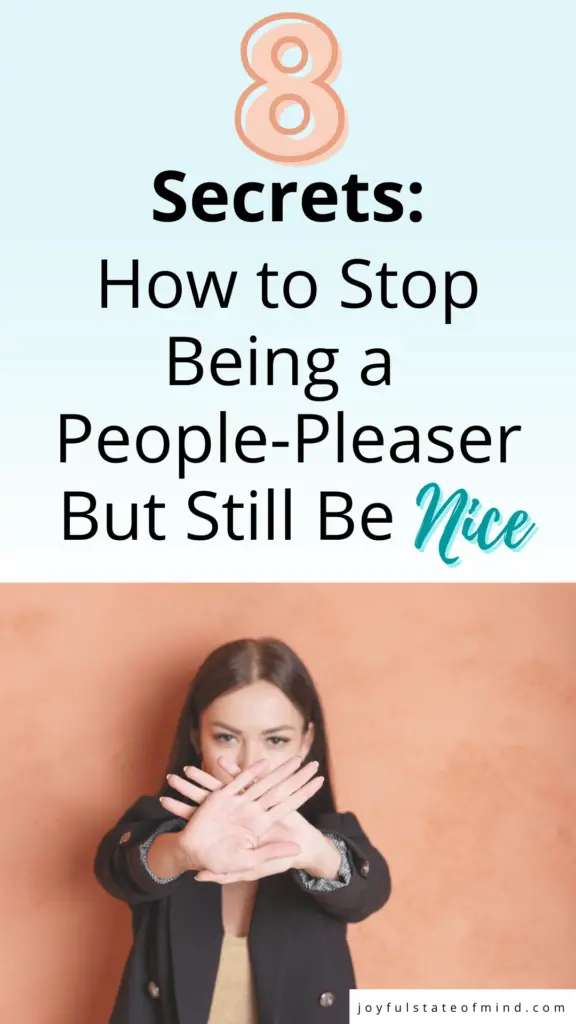
Disclaimer: Please note this post is not medical advice, and you should connect with a professional doctor or therapist if you are struggling with any mental or physical health concerns. See our disclaimer page.
How to Stop Being a People Pleaser But Still Be Nice
To be clear, wanting to please others, seeing people happy, and building connections are all beautiful things.
It’s the habit of people-pleasing and obsessing over keeping others happy that isn’t healthy and emotionally draining.
But you can start to improve your people-pleasing ways by taking simple steps to become more assertive (in a respectful way) and setting better limits for yourself.
Let’s explore these effective strategies for overcoming being a people-pleaser.
1. No Is Not a Curse Word.
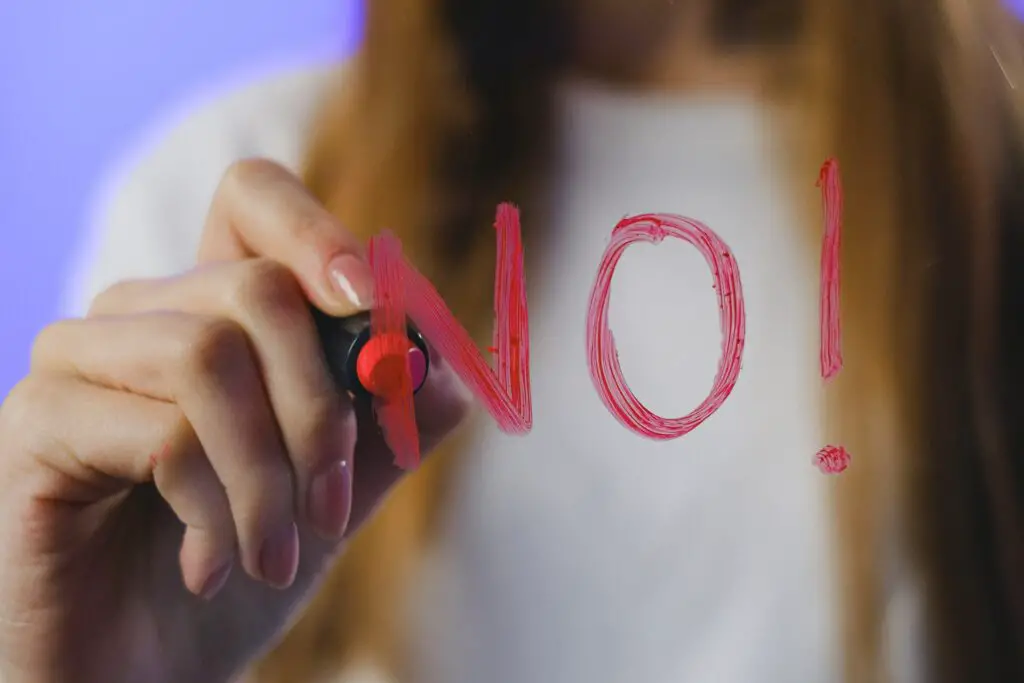
Years ago, I had a coworker whom everyone absolutely loved. She had an abundance of positive energy and was always willing to lend a helping hand to anyone. I left that job and bumped into her years later, but something was different about her—her spark was gone, and she looked exhausted. I asked what was happening, and she told me how difficult her life had been and how she never cared for herself.
It was sad to hear her story, and then I realized her life had been this hard for decades, even when she was the cheerful person helping everyone out. She was a chronic people-pleaser, and the toll that took on her was painfully apparent years later.
When you’re a people-pleaser, saying no is difficult, if not next to impossible. You don’t want to hurt anyone’s feelings and fear they may become upset or reject you.
But being comfortable with saying no is essential in gaining control over a people-pleasing habit. Remember that “No” is not a curse word.
You can practice with small steps, such as politely declining over a text message or role-play saying no in different situations with your partner or a friend.
If you’re in a situation with someone you care about and want to help, you can offer alternatives instead of an outright no.
Here are some examples:
- If an acquaintance invites you to dinner that you don’t have time for, offer to go for a quick coffee break instead.
- When someone asks you to help them move, and you can’t offer to come to help tidy up another day.
- If someone asks you to attend their child’s birthday party, politely decline but say you’d like to drop off a gift.
- If asked to speak at an event you’re not interested in, say you have other plans but can provide some input.
There’s power in saying no, but it can be a difficult decision. I have you covered with this post highlighting 102 ways to say no for people-pleasers, plus other helpful insights in case you get stuck!😘
When it comes to other situations or people you’re not close to, you can offer an empathetic no. Let them know you’re sorry you can’t help or can’t attend the event as you have other commitments. This approach helps disarm a person’s possible frustration or upset.
Pro Tip from Tony Robbins:
“In the end, remember, it’s your right to say no. It doesn’t mean you’re exercising some sort of immutable ego trip. It means you’re saying “no” because the proposed ask doesn’t suit your schedule or beliefs – and that’s okay.” (2)
2. Healthy Boundaries Are Like Bodyguards.
Personal boundaries are limits and rules we set for ourselves in social relationships. (3)
It’s not always easy, but being assertive when necessary lets others know your needs matter and that you value and love yourself. Ultimately, you have to teach others how to treat you.
Setting clear personal boundaries is an essential step to stop being a chronic people-pleaser.
If you struggle with establishing healthy boundaries in a relationship, it can lead to numerous negative impacts. As this PsychCentral article notes (4):
- Loose boundaries lead to burnout–and a loss of identity.
- They lead to disconnected relationships.
- Loose boundaries also lead to higher levels of resentment.
💡Tip: Healthy boundaries are like bodyguards that take care of your emotional well-being. They set limits for what’s acceptable and what’s not.
Creating those boundaries will help build respectful relationships and protect you from unhealthy ones. When you have healthy boundaries, you’re much less likely to obsess over pleasing others and are more comfortable saying no.
Here is a helpful fact sheet about personal boundaries.
3. Putting Your Needs First Makes You Less Selfish.
We all have commitments and unique needs to meet, and chronic people-pleasing can interfere with those priorities.
Clinical psychologist Dr. L. Firestone says that prioritizing your needs is an “unselfish art” and in fact:
“…when we do make time for our wants and needs, we are more alive to the world around us, more available, and more giving of our fullest selves. In effect, we are our least selfish, while still honoring our sense of self.” (5)
Maybe you’re an introvert like me, so you need limits on social time. Perhaps you have a bad back and need to limit what you lift. Maybe you have an elderly parent you care for and need to allot time to this.
Whatever they are, do your best to protect those needs, and when people make requests of you, first pause before agreeing. Then, you can think about what you have going on and prioritize important personal needs that you can’t just drop. (Read #6 below for more on this.)
Also, be mindful not to compromise your values to please others. Not staying true to who you are inevitably makes you feel awful and, in the long run, can damage your integrity, which is never worth it.
Related article: 70 Best Self-Care Ideas to Reduce Stress in Your Life
4. Affirm Your Love For Yourself.

Intentionally choosing to be kind and love yourself is a powerful tool for boosting confidence and helping break the people-pleasing habit.
Expert Dr. Neff’s extensive research has proven that being kind to ourselves and practicing self-compassion improves our overall well-being. (6)
People-pleasing is based on satisfying someone else’s needs and being hungry for their approval. It’s essentially the opposite of self-love.
You’re not practicing self-love or self-compassion when you obsess over making others happy while overlooking your own needs or commitments.
When you focus on pleasing yourself first, you’ll feel better about yourself and be less likely to want to please everyone around you.
5. How To Stop Being a People Pleaser: Say Goodbye to Insincere ‘Sorry’s.
Psychologist, Dr. Breines, notes that:
“Over-apologizing can become self-destructive, signifying excessive self-doubt or making the apologies appear insincere.” (7)
Being humble and apologizing is wonderful when you’re genuinely sorry or have something legitimate to be apologetic for.
However, apologizing to smooth things over or make others feel comfortable is emotionally draining and a toxic habit.
Over-apologizing can also undermine your authority, for example, at a work meeting or during important family discussions.
Instead of habitually apologizing, try these:
- Saying thanks. For example, when you’re late, say thanks for waiting instead of sorry, which has a negative tone and can appear insincere. Or: Thanks I appreciate you understanding that I can’t make it.
- Being more accepting of yourself. For example, you don’t need to apologize for looking tired, taking your time to do something, or not being the best dancer. We all have imperfections, so show yourself grace and skip those types of apologies.
- Saving apologies for when necessary. Over-apologizing can desensitize people to your apologies. So before saying “sorry,” take a pause and only say it if it’s appropriate.
6. Take Your Time to Respond. Remember, You Always Have a Choice.
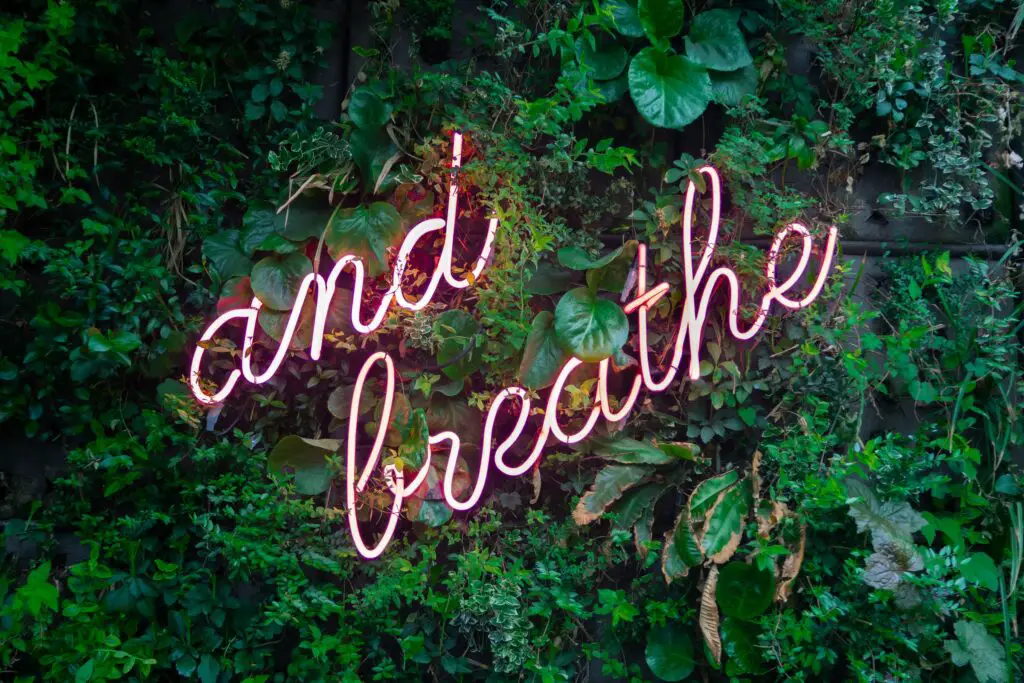
Learn to buy yourself time when someone makes a request. Try to avoid those knee-jerk reactions of saying yes. You know those ones that you immediately regret and then beat yourself up over–boo to that!🙅🏻♀️
There is power in pausing and thinking before you have those quick reactions. (8)
Instead, take time to give the request proper thought. You can say things such as:
- “Let me think about that.”
- “I’m busy now and will get back to you later.”
- You can also ask clarifying questions.
Also, remember you always have a choice to say yes or no.
This may be easier said than done, especially when it comes to family, but it’s doable.
When you keep doing things out of perceived obligation or thinking, you have no choice; you’ll start feeling resentful and emotionally drained.
7. Face Your Fears Around Anger and Rejection.
No one wants to have someone angry at them or be rejected. These are hurtful and stressful feelings to deal with. Researchers who have dug deep into the root of rejection have found surprising evidence that the pain of being excluded is similar to the pain of physical injury. (9)
Being overly concerned and fearful of people’s upset or rejection can be paralyzing and stop you from achieving your goals. But please don’t be hard on yourself for struggling with this.
Just take it one step at a time and focus on moving forward and empowering yourself to let go of these fears; you can do it.💪
It can be scary, but once you begin to face those fears, you’ll begin to build more confidence in this area.
To help, try techniques such as:
- Journaling
- Practicing positive self-affirmations to build your confidence
- Rejecting negative self-talk and replacing it with self-compassion
- Talk it over with someone you trust
Learning to face these fears is an essential step in overcoming chronic people-pleaser tendencies. The more you try to avoid conflict or protect yourself from rejection, the worse your fear of it will become.
Avoidance might temporarily relieve stress, but it’s not a helpful strategy or solution in the long run.
Some people may not like it when you say no, especially if they’re used to you always agreeing. As you build up courage, start with small things for practice and then work up the confidence to say no to the bigger things. It’s totally possible to respectfully give an assertive response without being rude.
Note: Struggling with fears could be a sign of anxiety or trauma, and in this case, connect with your doctor to discuss and see what professional options there are for you.
8. Everyone’s Not Going to Love You, and That’s OK!

Who doesn’t love beautiful sunshine or ice cream? Both on the same day is even better, right?!☀️🍦 Unfortunately, you’re neither of these two things so the truth is….
You’ll never be able to please everyone. It’s impossible. That’s perfectly OK!
Some people are not worth your time. It’s better to move on from toxic people rather than try to keep their anger at bay.
If someone likes you only when you’re doing something for them or it’s convenient, those are not the people you want to keep in your circle. These are the same people who will ghost you when you’re no longer seen as useful to them, so why would you try to please them?
I kept certain people in my life for too long. When I finally realized its negative impact on my family and me, that was a powerful turning point in my journey to breaking my people-pleasing ways and prioritizing what matters most.
So don’t put pressure on yourself because pleasing everyone is futile.
How To Stop Being A People-Pleaser: The Most Powerful Fix
When I attended that party I knew I shouldn’t go to because of being a people-pleaser I paid the emotional consequences and it’s still a painful memory 😢 but at the same time, it was a pivotal lesson in me breaking this unhealthy habit. I learned that…
The most potent fix when it comes to how to stop being a people-pleaser is showing yourself kindness. That mindset shift is life-changing, and the best part is that it doesn’t cost a thing.
Self-compassion is one of my life mantras and has been a mindset shift that has made a significant difference in my life.
The danger lies when you’re focused on everyone else’s needs and worried about ruffling feathers. If you struggle with some of the points above, do your best to start making changes to protect yourself and your emotional well-being.
So start small and try some of these strategies to stop being a people-pleaser. Then, you’ll begin moving away from this unhealthy habit and living with more joy by showing yourself grace and kindness.
I’m cheering you on and know you can do it.💯
Related article: How To Stop Worrying and Be Happy Now
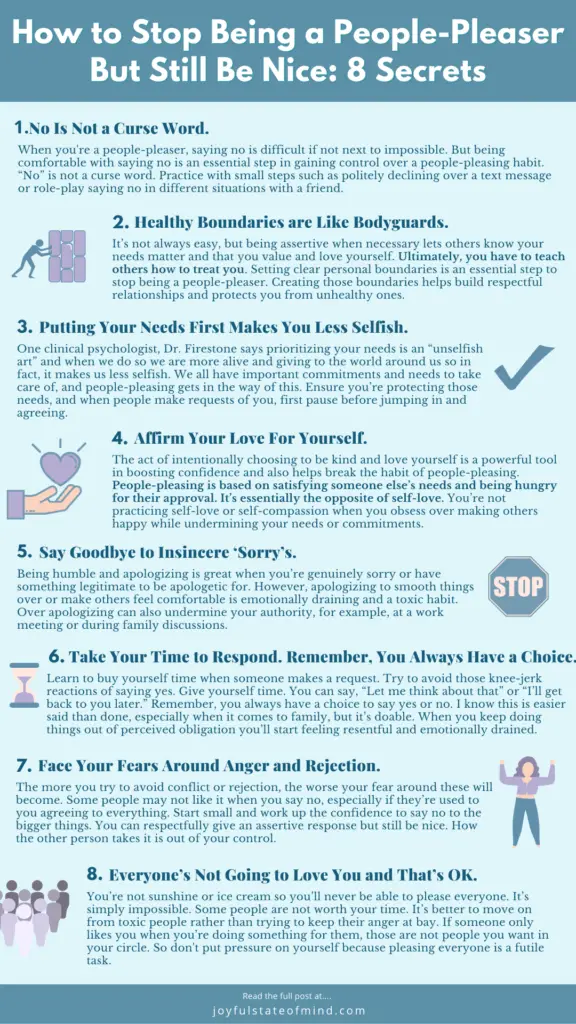
Bonus: The Best Books About People Pleasing
The Disease to Please: Curing the People-Pleasing Syndrome (2002) by Harriet B. Braiker Ph.D.
Not Nice: Stop People Pleasing, Staying Silent, & Feeling Guilty… And Start Speaking Up, Saying No, Asking Boldly, And Unapologetically Being Yourself (2017) by Dr. Aziz Gazpiura.
Anxious to Please: 7 Revolutionary Practices for the Chronically (2006) by James Rapson and Craig English
Approval Addiction: Overcoming Your Need to Please Everyone (2008) by Joyce Meyer
Boundaries Updated and Expanded Edition: When to Say Yes, How to Say No To Take Control of Your Life (2017) by Henry Cloud and John Townsend.
Bonus: Powerful People-Pleasing Quotes
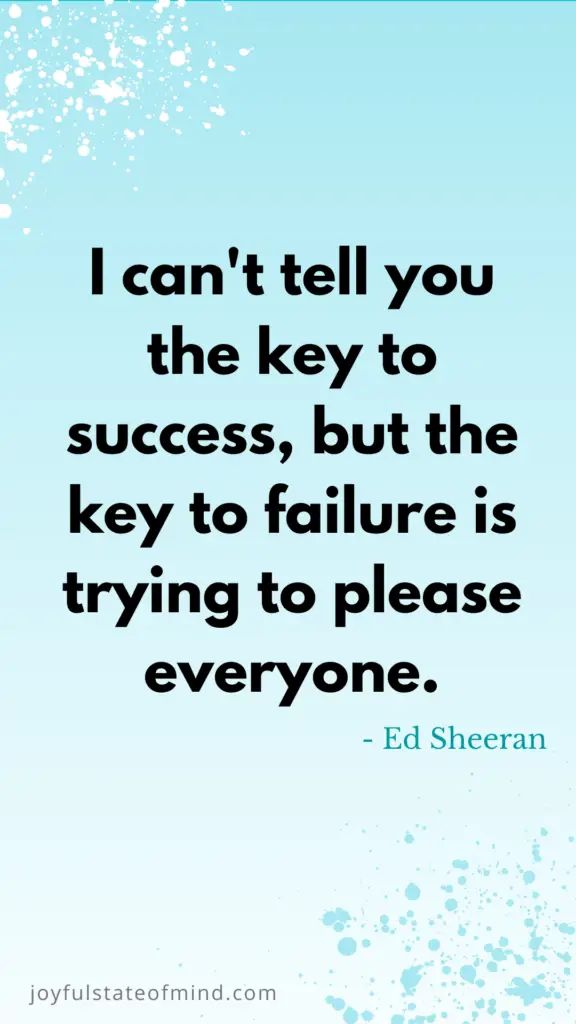
I can’t tell you the key to success, but the key to failure is trying to please everyone. —Ed Sheeran
We must not confuse the command to love with the disease to please. —Lysa TerKeurst
Don’t be afraid of losing people, be afraid of losing yourself by trying to please everyone around you. —Unknown
When you say ‘yes’ to others, make sure you are not saying ‘no’ to yourself. —Paolo Coehlo
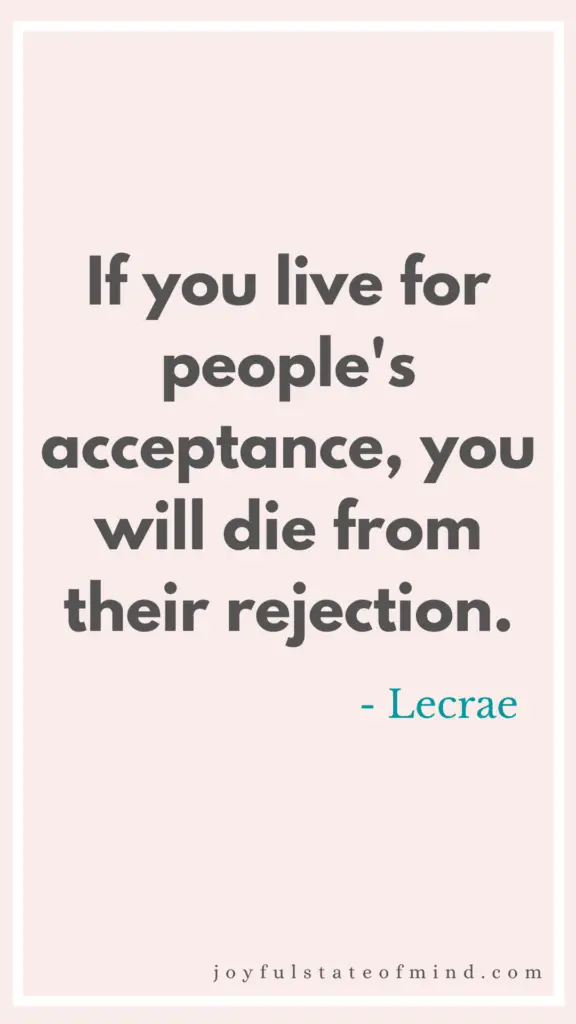
If you live for people’s acceptance, you will die from their rejection. —Lecrae
Let your light shine today, and let your personality blossom too. You don’t have to be a people-pleaser, just be a people-lover. —Beth Moore
People pleasing doesn’t allow you to receive. —Abiola Abrams
The only thing wrong with trying to please everyone is that there’s always at least one person who will remain unhappy. You. —Elizabeth Parker
There just isn’t any pleasing some people. The trick is to stop trying. —Robert Mitchum
FREE GIFT: As a bonus for joining my newsletter, get this free guide including 65 self-love affirmations:
The Quick Start Guide to Self-Love Affirmations: Boost Your Confidence + Feel Better About Yourself.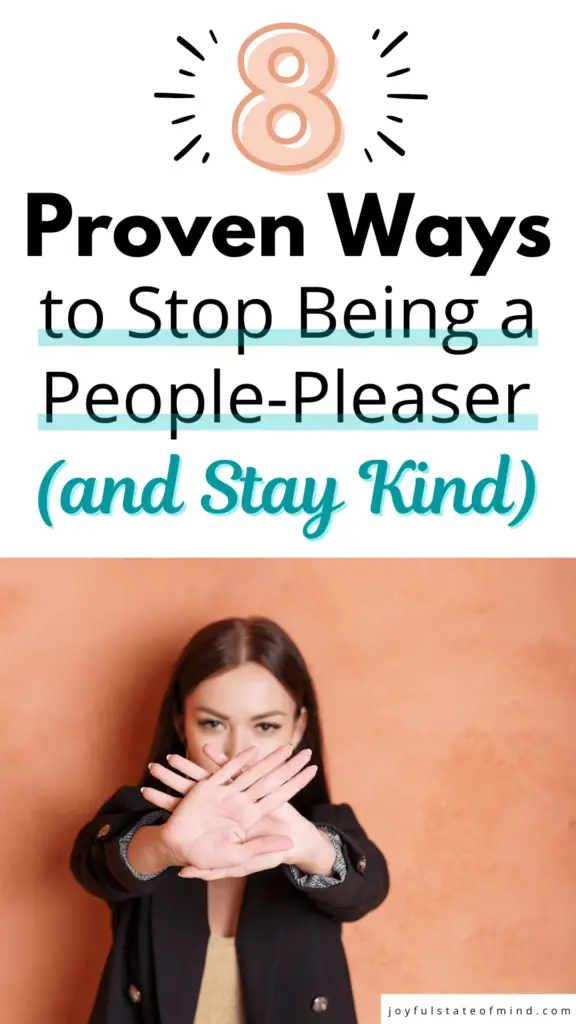
RESOURCES:
1.https://www.merriam-webster.com/dictionary/people%20pleaser
2.https://www.tonyrobbins.com/mind-meaning/the-power-of-no
3.https://uhs.berkeley.edu/sites/default/files/relationships_personal_boundaries.pdf
4.https://psychcentral.com/lib/a-pep-talk-for-people-pleasers-for-setting-boundaries#3
5.https://www.psychologytoday.com/ca/blog/compassion-matters/201708/the-unselfish-art-prioritizing-yourself
6.http://self-compassion.com
7.https://www.psychologytoday.com/ca/blog/in-love-and-war/201306/when-im-sorry-is-too-much
8. https://www.mindfulleader.org/blog/44061-the-power-of-a-pause
9. https://www.apa.org/monitor/2012/04/rejection
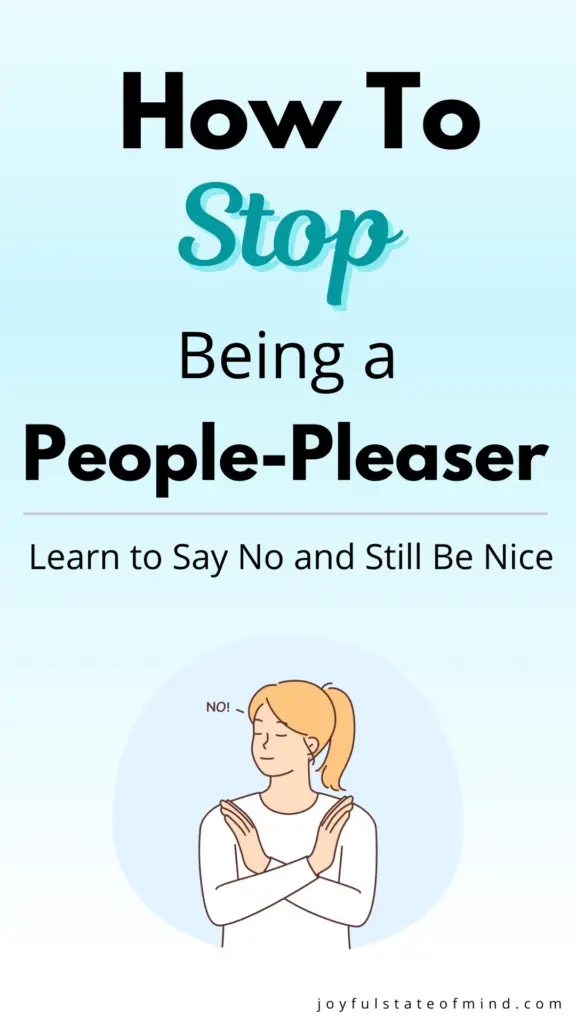






This really resonates with me as I am a people pleaser and avoid conflict as much as possible. It’s really hard to break those habits and I love all of your suggestions!
Jill – Doused in Pink
So glad this was helpful, Jill! I hope you had a great week.
Martha, This has so much great and applicable information! I struggle with being a people-pleaser – and your tips on practicing saying “no” and swapping the negative with a positive – and being prepared with alternatives – and not feeling like you have to give immediate answers – are all great solutions!
Practicing saying no and not feeling pressured to respond immediately has been really helpful for me. I’m so glad you like these recommendations, Lisa!
This is such a timely post especially as social calendars and other obligations begin to increase as people are vaccinated. Taking time to respond always helps me!
Thanks, Laura! That’s a good point about obligations and social events beginning to increase as things begin to improve.
Women tend to be people pleasers and I am no exception! I am a 2 on the Enneagram so pleasing others is a big part of my personality. Been working on it and learning to take care of myself. I am not afraid of conflicts so watch out! Lol! Thanks for such an insightful post!
https://www.kathrineeldridge.com
So true, Kathrine! I’m glad you are learning to take better care of yourself and that you’re not afraid of conflict, lol:)
Learning how to say no and being OK with it can be the toughest thing! I know it’s taken me a long time to achieve it for myself. Thanks for these tips!
Shauna
http://www.lipglossandlace.net
It can indeed be challenging, especially for women. That’s why I was excited to write this post. It’s good to hear that you got to a place where you are comfortable with saying no, Shauna.
These are wonderful suggestions! While it’s great to be polite and get along with everyone, you don’t have to be everyone’s cup of tea.
xoxo
Lovely
http://www.mynameislovely.com
Exactly, Lovely! I completely agree. Thanks for stopping by:)
This post is SO good, Martha. I felt connected to so many of these points because I’ve certainly experienced people-pleasing tendencies. It’s still a battle for me. As you know, healthy boundaries are something that I’ve fought with recently. I’ve always found it hard to say ‘no’ more often than I should, but I’m learning how to handle that better and prioritize what my needs too.
Wishing you the brightest day, my friend!
Make Life Marvelous
Thanks for the kind words, Ashley! I’m so glad you are making progress with creating healthier boundaries and with saying no. I hope you have a wonderful week ahead!
So important and you really nailed it! Thanks for sharing these tips. Definitely something I need to work on myself.
XX Angelica
https://eraenvogue.com
Thanks for stopping by, Angelica!
Wow great post and quite helpful. This always seems to be more of a problem with women. Women really need to learn to have boundaries I guess it is partly the mothering instinct. But we do also have to please ourselves too.
Allie of
http://www.allienyc.com
Thanks, Allie. I’m happy you found this helpful, and I agree it’s an area most women struggle with.
Number 6 is the one that I´m struggling the most with, but I´m working on improving it 🙂
have an awesome day,
Tiziana
http://www.tizianaolbrich.de
Hi Tiziana, that’s one I used to struggle with too. I often had those knee-jerk reactions and then regretted it. Great to hear that you’re working on it:)
omg, I should totally send this post to my boyfriend. It seems he cannot say not anyone (well, except me haha). he is the biggest Monica Geller there ever was.
I’m happy to hear you’re working on yourself to be more firm. Honestly, people also respect you more when you put limits and know how to say no.
Ana Palombini
That’s so true that people respect you more when you create boundaries and stand up for yourself, thanks for sharing, Ana!
Such an important topic! 🙌 It’s so easy to fall into the trap of people-pleasing. Love these practical tips. Thanks for sharing! 😊
I agree; thanks so much for your comment, Teja! 🙂